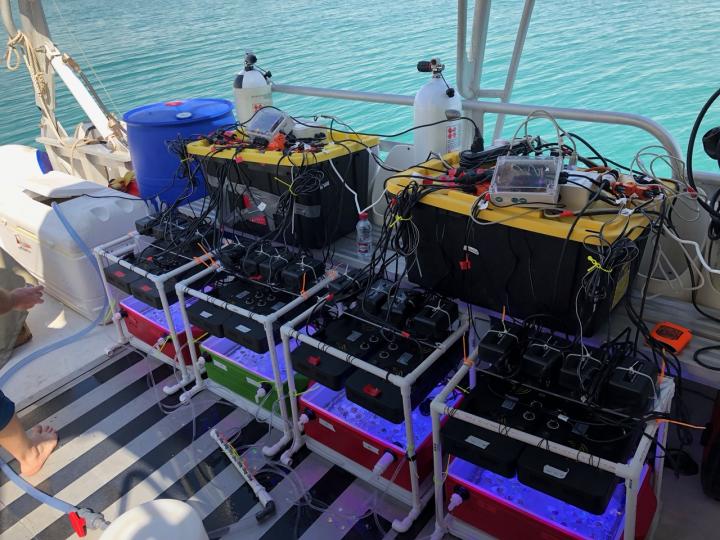

Corals are placed in test boxes at the location where they were collected and then subjected to thermal exposures at different temperatures.
Credit: Christian Voolstra
Some corals, however, are more resistant to increasing temperatures. In order to effectively protect coral reef habitats, it is important to identify which corals and reef sites are more resistant and thus have a greater chance of survival.
For this purpose, the research team led by Konstanz biologist Professor Christian Voolstra developed a rapid stress test to assess coral thermotolerance. The “Coral Bleaching Automated Stress System” (CBASS) makes it possible to assess coral thermotolerance on site and within a single day – much faster than current experimental procedures that typically take several weeks to months in a laboratory.
A description of the test and a demonstration of its utility to resolve thermotolerance differences between close-by reef sites was published as an online early article on 21 June 2020 in the journal Global Change Biology.
The test system is highly mobile, can be deployed on boats, and is straightforward to use: Corals are placed in test boxes at the location where they were collected and then subjected to thermal exposures at different temperatures – a type of stress test for the corals.
Using a standardized procedure, researchers can then record the results and compare how different corals react to the same set of temperature exposures.
“We focused on building the test boxes with materials that are available in almost any hardware store or shop selling aquarium equipment. We want these test boxes to be used widely and this is why we made all instructions for setting up the tests as well as our results and evaluation methods freely available”, Professor Christian Voolstra states in reference to the online archive: https:/
Read the full article in campus.kn, the online magazine of the University of Konstanz: https:/
###
Key facts:
– Original publication: Voolstra CR, Buitrago-López C, Perna G, et al. Standardized short-term acute heat stress assays resolve historical differences in coral thermotolerance across microhabitat reef sites . Glob Change Biol . 2020 ; 00 :1 – 16 . https:/
– Rapid test to assess coral thermotolerance – contribution to assessing the chance of survival for coral reefs in response to climate change.
– Developed by Professor Christian Voolstra, Professor of Genetics of Adaptation in Aquatic Systems at the University of Konstanz.
– The rapid test can be completed on site and in one day (test takes 18 hours). Current laboratory tests usually take several weeks.
– Standardized procedure enables global comparison of data.
– Relatively affordable, do-it-yourself construction of test equipment: Relatively affordable, do-it-yourself construction of test equipment: Material for a complete system consisting of four text boxes costs around € 4,000 in total.
– Instructions for building the required test boxes, as well as information about the data gathered and evaluation methods used are freely available online in the authors' archive: https:/
– The research was a collaboration between the University of Konstanz and the King Abdullah University of Science and Technology (KAUST) in Thuwal (Saudi Arabia) that was supported by the Binational Science Foundation.
– campus.kn is the University of Konstanz's online magazine. We use multimedia approaches to provide insights into our research and science, study and teaching as well as life on campus.















